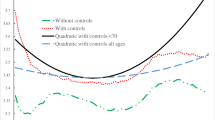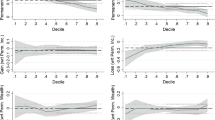Abstract
The relationships between marital status, proximity of children, and attitudes toward retirement of 432 men and 373 women on the verge of retirement were studied. Three dimensions of attitudes were examined: attitudes toward losses associated with retirement, toward gains in entering retirement, and toward gains in leaving work. Women hold significantly more positive attitudes toward both types of gains; there are no gender differences concerning attitudes toward losses. The married of both sexes perceive more gains in entering retirement. Proximity of children is curvilinearly related to gain in entering retirement, especially among women. Attitudes toward losses and gains in leaving work are not associated with familial state. The meaning of work and the myth of the primacy of family for women are discussed.
Similar content being viewed by others
References
Antonovsky, A. Health, stress, and coping. San Francisco, CA: Jossey-Bass, 1979.
Antonovsky, A., & Arian, A. Hopes and fears of Israelis. Jerusalem, Israel: Jerusalem Academic Press, 1972.
Antonovsky, A., Adler, I., Sagy, S., & Visel, R. Attitudes toward retirement in an Israeli cohort. International Journal of Aging and Human Development, in press.
Abel, B. J., & Hayslip, B., Jr. Locus of control and attitudes toward work and retirement. The Journal of Psychology, 1986, 120, 479–488.
Anderson, R. E., & Paludi, M. A. Working mothers and the family context: Predicting positive coping. Journal of Vocational Behavior, 1986, 28, 241–153.
Atchley, R. Adjustment to loss of job and retirement. International Journal of Aging and Human Development, 1975, 6, 17–27.
Atchley, R. The sociology of retirement. Cambridge: Schenkman, 1976.
Atchley, R. The process of retirement: Comparing women and men. In M. Szinovacz (Ed.), Women's retirement: Policy implications of recent research. Beverly Hills: Sage, 1982.
Atchley, R. C., & Robinson, J. L. Attitude toward retirement and distance from the event. Research on Aging, 1982, 4, 299–313.
Crawford, M. P. Retirement and disengagement. Human Relations, 1971, 24, 255–278.
Doise, W. Individual and social identities in intergroup relations. European Journal of Social Psychology, 1988, 18, 99–111.
Evans, L., Ekerdt, D. J., & Bosse, R. Proximity to retirement and anticipatory involvement: Findings from the Normative Aging Study. Journal of Gerontology, 1985, 40, 368–374.
Fox, J. H. Effects of retirement and former worklife on women's adaptation in old age. Journal of Gerontology, 1977, 32, 196–202.
Fusilier, M. R., Ganster, D. C., & Mayes, R. The social support and health relationship: Is there a gender difference? Journal of Occupational Psychology, 1986, 59, 145–153.
Geerken, M., & Gove, W. R. At home and at work. Beverly Hills, CA: Sage, 1983.
Gigy, L. L. Preretired and retired women's attitudes toward retirement. International Journal of Aging and Human Development, 1985–1986, 22, 31–44.
Glamser, F. D. Determinant of a positive attitudes toward retirement. Journal of Gerontology, 1976, 31, 104–107.
Haas, L. Wives orientation toward breadwinning. Journal of Family Issues, 1986, 7, 358–381.
Jacobson, D. Rejection of the retiree role: A study of female industrial workers in their 50's. Human Relations, 1974, 27, 477–492.
Joreskog, K. G., & Sorbom, D. Lisrel: Analysis of linear structural relationships by the method of maximum likelihood. User's guide (version VI). University of Uppsala, Uppsala, Sweden, 1986.
Merton, R. K. Social theory and social structure, Glencoe, IL: The Free Press, 1958.
Nieva, V. F. Work and family linkages. In L. Larwood et al. (Eds.), Woman at work, Vol. 1, Beverly Hills, CA: Sage, 1985.
Oppenheimer, V. K. The female labor force in the United States. Berkeley: University of California Press, 1970.
Richardson, L. W. The dynamics of sex and gender. Boston: Houghton Mifflin Co., 1981.
Seccombe, K., & Lee, G. R. Gender differences in retirement satisfaction and its antecedents. Research on Aging, 1986, 8, 426–440.
Szinovacz, M. Women's retirement: Policy implications of recent research. Beverly Hills, CA: Sage, 1982.
Author information
Authors and Affiliations
Additional information
This paper draws on research supported by Grant Number 1 R01 AG 05206-01 from the National Institute on Aging.
Rights and permissions
About this article
Cite this article
Anson, O., Antonovsky, A., Sagy, S. et al. Family, gender, and attitudes toward retirement. Sex Roles 20, 355–369 (1989). https://doi.org/10.1007/BF00287996
Issue Date:
DOI: https://doi.org/10.1007/BF00287996




